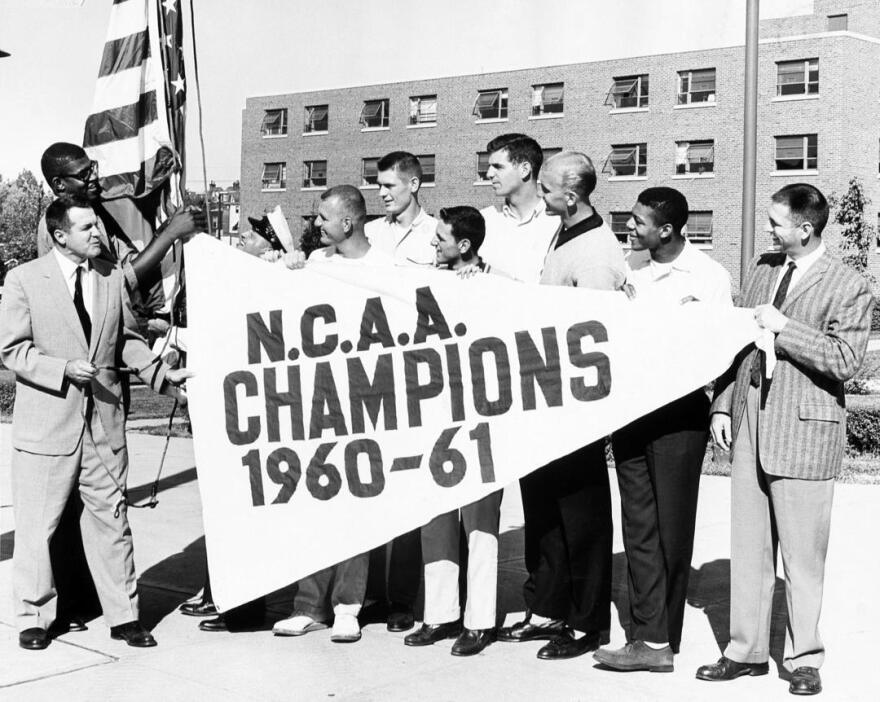It was a daunting task: How do you take 20 minutes of silent game film, and turn it into a two-hour rebroadcast of the University of Cincinnati's 1961 NCAA basketball championship victory over defending national champs Ohio State?
But Emmy-winning director-producer David Ashbrock did it – and the result can be seen 8-10 p.m. Sunday night on WSTR-TV hosted by current UC radio announcers Dan Hoard and Terry Nelson.
It won't look like the old games sports fans are accustomed to watching on ESPN, FS1 and the MLB or NFL networks. That's because no film existed of UC's overtime win in the 1961 NCAA championship game in Kansas City until this one was created by Ashbrock, a 1978 UC College-Conservatory of Music graduate. (The NCAA basketball game was not televised nationally until 1962, Ashbrock says.)

Ashbrock, who has directed hundreds of basketball and football telecasts, spent six years assembling the 1961 title game by marrying six reels of black and white "coach's film" shot for head coach Ed Jucker with an audio recording of Daryl Park's play-by-play.
"It's made from a lot of shards put together carefully and strategically so it looks like a real game," Ashbrock says.
The fragments were far from perfect:
THE FILM: The "coach's film" was shot by a single camera high above mid-court. So there's no multiple views, like an under-the-basket view of rebounds and foul shots; or close-ups of Bearcats Tony Yates, Tom Thacker, Ron Bonham, Paul Hogue and George Wilson; or Ohio State stars Jerry Lucas, John Havlicek, Larry Siegfried and Bob Knight.
The footage, found years later by Jucker's widow in their attic, was shot for coaches to study the offense and defense – so the camera didn't start rolling until the ball crossed the mid-court line.
THE AUDIO: Jucker had an incomplete audio tape of the Cincinnati TV play-by-play by Park, a WKRC-TV weatherman and announcer (and no relation to former WLW-AM program director Darryl Parks). He apparently described the game when Channel 12 broadcast a video feed from a Kansas City station, Ashbrock says. The final two minutes of regulation were garbled, and he didn't have any audio of the five-minute overtime period.

"They lost the feed, and it sounded like someone put a microphone in front of a speaker. It was dreadful," Ashbrock says.
Ashbrock told me about the audio problem in 2015. I hooked him up with John Perin, sports director at Owensville's all volunteer WOBO-FM and a local radio historian. It turned out that Perin had a recording of Park's play-by-play.
"The only real-time record of the broadcast was the audio portion – 'the call' – that was preserved by some ingenious fans who were able to record the sound from the TV. Even that keepsake wasn’t widely circulated," Ashbrock says.
After tracking down the audio, Ashbrock has another hurdle: How do you reconstruct the entire game when you have twice as much play-by-play audio than game action film?
Ashbrock used his editing wizardry to fill out the game with approximately 90 slow-motion replays. Then he rewatched his assembled film a dozen times to create his own running list of statistics (baskets, free throws, rebounds) to create on-screen graphics and a scoreboard – information automatically provided by computer software during today's live game telecasts.

And then he had to manufacture an on-screen game clock that synced with Park's play-by-play.
"I had to figure out when the clock would start and stop. Daryl would say, 'There's 8:15 remaining in the game,' but it took days and days and days and days to figure that out so I could sync the film to the clock. It took a long time because I knew I had to get this right," he says.
The pregame and postgame sections include some 1986 interviews with Jucker and former players from the 25th anniversary, says Ashbrock, who worked on WXIX-TV's UC basketball telecasts from 1982 to 1987.
Ashbrock originally pitched UC on doing a documentary about the team, which won back-to-back national championships (1961-62) after superstar Oscar Robertson graduated in 1960. He changed to recreating the game film after Yates – the former Bearcats head coach – became ill and could not participate in the project. Yates died last May. Jucker died in 2002.

"Instead of doing a documentary, I decided to reconstruct the game. People watch old games on ESPN all the time," he said.
The NCAA has some film of the 1961 championship game, which is "washed out and over-exposed. The quality and clarity of the Jucker film was much better," he says.
Ashbrock offered WKRC-TV the film after Fox Sports Ohio (now Bally Sports Ohio) turned him down. He's very pleased with time slot on sister station WSTR-TV at 8 p.m. Sunday, the night between Saturday's Final Four games and Monday's national championship.
"I wanted to get it on at a time when everyone is thinking about basketball," he says.
"Unless you happened to watch the coverage that night, you’ve never seen the Bearcats upset the Buckeyes for the crown jewel," he says. "This special broadcast of the 1961 national basketball championship is the crowning moment in the storied history of Bearcat basketball, brought back to life 60 years after it happened, for Bearcat fans to enjoy now!"'
What happens to it after that?
"That's a good question," he says. "A few years ago, it could have been sold by UC as a DVD for $20 to benefit UC. But nobody buys DVDs any more. They pay $2.99 for a stream. This is a TV show first, and then we'll see what happens after that."




